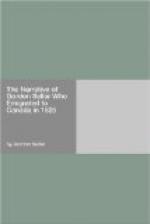This ridiculous attempt at a revolution had one good and one bad effect. The good, was a change in the government that made conditions more tolerable; the bad, was in giving color to fastening upon Liberals the stigma of disloyalty. The leaders in the attempted rising had declared for separation from Britain, and those of them who escaped across the frontier became avowed annexationists. What they were the Tories asserted all Liberals were and the maintenance of British connection depended upon their being kept out of office. The many years that have passed have made that pretension traditional, and whenever there is an election, I hear the charge of disloyalty imputed to Liberals and the claim to exclusive loyalty made by their opponents.
The passing years have wrought a marvellous change in the face of the country. Our drive up Yonge-street in 1825 was like a boat tracing a narrow channel of the sea. On either hand was a continuous wall of forest, and where an attempt had been made to push it back the uncarved bush projected like rocky promontories. The houses passed at wide intervals were shanties; the clearances in which they were set cluttered with stumps. How different now. Handsome residences have replaced the log-shanties, the bush has become a graceful fringe in the background of smooth, well-tilled fields. Like the ocean which keeps no trace of the keels that have furrowed its wastes, these beautiful fields are the speechless bequest of the men and women who redeemed them from savagery at the cost of painful privations, of exhausting, never ceasing toil, of premature decay of strength. They fought and overcame and succeeding generations enjoy the fruits of their labors—fruits they barely lived to taste. These were the men and women who made Canada, the founders of its prosperity, the true Makers of the nation to which it has grown. It is common for politicians and their newspapers to steal for their party-idols




